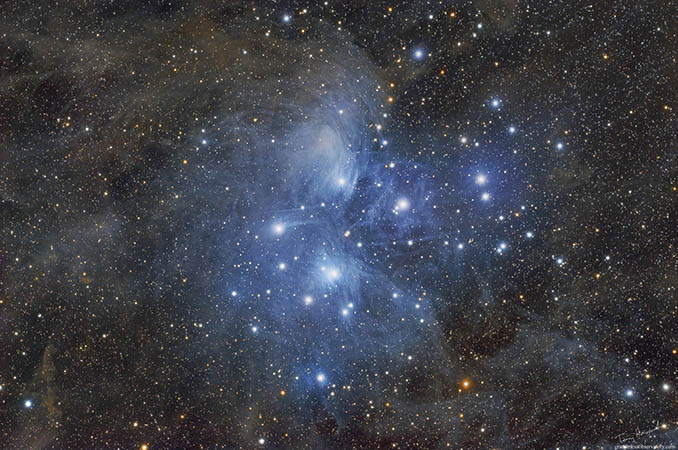The Pleiades open cluster, or Messier 45, in Taurus is pretty much as good because it will get for night-sky eye sweet. There are solely a handful of deep-sky objects that come near its fame and sheer majesty. For amateur and skilled observers alike, its affect just isn’t restricted in any method: it’s simply seen to the naked-eye in most skies and appears excellent by way of a pair of binoculars or a small telescope, whereas house owners of bigger telescopes can discover intimately the wispy blue nebulosity that blankets its vibrant stars and imagers can seize the complete depth of its grandeur. Moreover, on November nights it’s on present for almost all of the lengthy nights, peaking excessive within the south on the not unreasonably late time of between 11pm and 1am GMT.
Pleiades lengthy historical past
Charles Messier added the Pleiades as M45, the final object to be included within the first model of his record of deep sky objects revealed in 1771. Messier first noticed the cluster in 1769 however in fact the Pleiades has been recognized since prehistoric occasions. Each important tradition down the ages has made reference to it, together with historic Chinese language annals relationship again to 2,357 BC and Mesopotamian mythology even additional again. Homer makes reference to it in his Odyssey and additionally it is talked about within the Previous Testomony. The earliest astronomical description of the Pleiades is credited to the Sicillian observer Giovanni Bastista Hodierna, who in 1654 counted a total of 37 Pleiads; Galileo counted 36.
Open clusters: destined to disperse within the blink of a cosmological eye
Open clusters are the merchandise of ongoing star formation within the areas of molecular hydrogen in our Galaxy’s spiral arms and overwhelmingly comprise younger, sizzling blue stars, over time scattering as a consequence of gravitational forces. Subsequently in virtually all cases open clusters are comparatively younger. The Pleiades (Messier 45) is believed to have fashioned some 125 million years in the past and is predicted to disperse throughout the subsequent 250 million years (the close by Hyades open cluster, the acquainted ‘V‘ form ‘head‘ of the Bull, is estimated to be almost 800 million years previous).
Over 1,400 stars reside throughout the Pleiades, sure to 1 one other by gravity however transferring away from each other quick sufficient that they may progressively disperse over the subsequent quarter of a billion years, changing into absorbed into the general mass of the galactic disc. A lot of the Pleiads (the identify given to the celebs within the cluster) are smaller and fainter than our Solar, whereas a number of dozen are hotter B-type stars. It’s this combine of enormous and small stars, all about the identical younger age, that gives astronomers with the proper place to match and distinction, and to check our understanding of how stars of various lots and luminosities develop.
How one can observe
Look forward to a moonless and clear night time at a website free from main sources of sunshine air pollution and let your eyes turn out to be darkish tailored for say between 15 and half-hour. Look about one-and-a-half fists (a fist held at arms size covers round 10 levels throughout the knuckles) to the north-west (upper-right) of magnitude +0.87 ruddy-red Aldebaran (alpha [α] Tauri). The Pleiades is the tight grouping of stars that resembles a mini ‘Plough’. Now the enjoyable begins!
What number of particular person stars throughout the cluster are you able to see? There are the truth is ten Pleiads (as particular person stars right here are sometimes termed) that shine brighter than sixth-magnitude. The 5 brightest Pleiades — Alcyone (eta [η] Tauri, the brightest Pleiad, Atlas, Electra, Maia, and Merope — vary from magnitude +2.9 to +4.2 and needs to be instantly obvious, however most individuals report six or seven. The cluster is historically generally known as the Seven Sisters, a reference to historic Greek mythology, however as many as 14 to 18 Pleiads have been claimed by eagle-eyed people!
Hopefully, you’ve introduced alongside a pair of 10 × 50 binoculars. Increase them to your eyes and be amazed! Their area of view simply encompasses the cluster, which, spanning two levels throughout or 4 full moon-widths, is bigger in angular extent than many anticipate. The great view reveals among the lots of of fainter stars scattered across the brighter cluster members, together with the aforementioned principal stars. A telescope of round 80mm (three inches) in aperture can present round 60 stars, however getting the entire cluster throughout the area of view may be problematic, even when it’s working at low energy.
Nearly each present-day picture of the Pleiades reveals it’s considerably swathed in picturesque, wispy-blue nebulosity that’s courtesy of the blue-white mild of Messier 45’s younger stars being fantastically mirrored and scattered by an enormous, random dust cloud that the cluster is presently travelling by way of.
The brightest a part of this nebulosity surrounds magnitude +4.1 Merope, the intense star on the southern nook of the ‘Plough’. Designated NGC 1435, a 250mm (ten-inch) telescope is a secure wager to select it up below typical UK sky circumstances.
GRAPHIC] M45 finder
CAPTION] The Pleiades in Taurus may be simply seen with the bare eye and needs to be acquainted to each observer.

